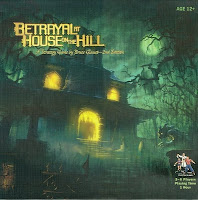 Agricola
AgricolaStart off as a poor farmer. You and your spouse have to choose how to manage their time. Do you collect building resources to build fences or improve your house? Do you plant grain? Collect animals? Build a fireplace so you can actually cook them? Eventually you'll want a larger family, which lets you get more work done, but you have to feed them all too.
This game is surprisingly balanced, and it handles 1 to 5 players. It's not even very hard to teach. The only real problem is the time the game takes. According to the box (which we've found rather accurate): half an hour per player.
 Betrayal at House on the Hill
Betrayal at House on the HillPlay a group of explorers checking out a creepy old mansion. Weird things happen as you explore each room until eventually you discover what's really going on. Maybe one of the explorers is an alien scientist trying to trap the rest of you for his experiments. Someone might become an incubation chamber for a nest of giant spiders, and you have to save them. Maybe you'll have to beat Death at a game of chess.
There are 50 different scenarios to play out, chosen randomly each time. Whereas Agricola is all about strategy (there's very little luck involved), Betrayal is all about the story. As a writer, that's what I love about it. I love when the young boy befriends the strong madman (Sloth love Chunk!). Or when the tough Ox Bellows turns on his girl, and she has to maim him with a strange dagger she found just to get away. I love that you can win even if almost all the explorers are killed (just like a real horror movie!). The game's a little creepy, but totally fun with the right people.
So what have you been playing lately?





